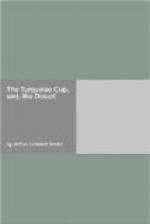At dinner, on the yacht, the night before, Phelim had been much in evidence. His six feet three had impressed the earl’s six feet. Phelim had been well dressed. “Confound him,” thought the earl, “he goes to Poole, or Johns & Pegg. Why doesn’t he get his clothes at home?” Then Phelim had talked much, and he had talked well. He had told stories at which the earl had been compelled to laugh. He had related experiences of his home-life, of the peasants, the priests, the clubs, hunting and shooting, his brief stay in Parliament, what he had seen in Venice during the last few days; and, when dinner was over, Lady Nora, who had been all attention, said: “Sing for us, Phelim,” and they had gone below, Phelim stooping to save his head; and he had struck those mysterious chords upon the piano, by way of prelude, that silence talk, that put the world far away, that set the men to glancing at the women, and the women to glancing at the floor and making sure of their handkerchiefs, and then—he had sung.
How can one describe a song? As well attempt to paint a perfume.
When Phelim finished singing Miss O’Kelly went over and kissed him, and Lady Nora went away, her eyes glistening.
The earl remembered all these things as he went up the aisle. He had passed that way five times each day for nine days. He came to the door of the treasury, thinking, not of Nora, but of Phelim—and the door was open.
He went in. The gorgeous color of the place stopped him, on the threshold. He saw the broidered vestments upon which gold was the mere background; jacinths were the stamens of the flowers, and pierced diamonds were the dewdrops on their leaves; he saw the chalices and patens of amethyst and jade, the crucifixes of beaten gold, in which rubies were set solid, as if they had been floated on the molten metal; he saw the seven-light candelabrum, the bobeches of which were sliced emeralds, and then his eyes, groping in this wilderness of beauty, lighted on the turquoise cup.
“My God!” he exclaimed, “she is right. She is selling herself for the most beautiful thing in the world. To steal it is a crime like Cromwell’s—too great to be punished,” and he put out his hand.
Then, with the cup and Nora within his reach, he heard a still, small voice, and his hand fell.
He began to argue with his conscience. “Who owns this cup?” he asked. “No one. The cardinal said it had been stolen. He said no one could sell it because no one could give title. Why, then, is it not mine as well as any one’s? If I take it, whom do I wrong? Great men have never let trifles of right and wrong disturb their conduct. Who would ever have won a battle if he had taken thought of the widows? Who would ever have attained any great thing if he had not despised small things?” and he put out his hand again; and then came surging into his mind the provisions of that code which birth, associations, his school life, and, most of all, his mother, had taught him. What would they say and do at his clubs? Where, in all the world, could he hide himself, if he did this thing? He turned and fled, and, running down the church steps, he came face to face with Lady Nora and Phelim. They were laughing gayly; but, when they saw the earl’s face, their laughter ceased.




